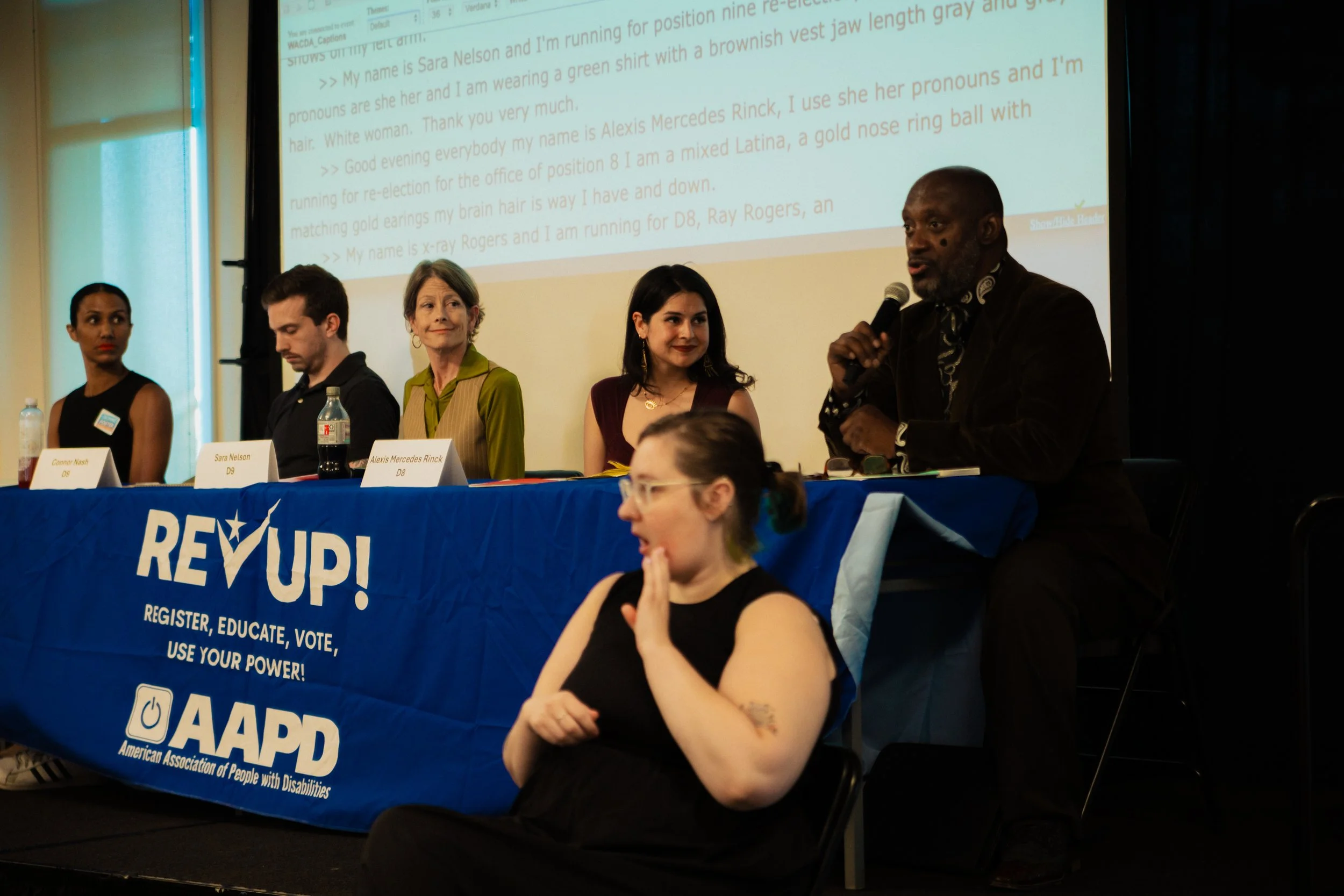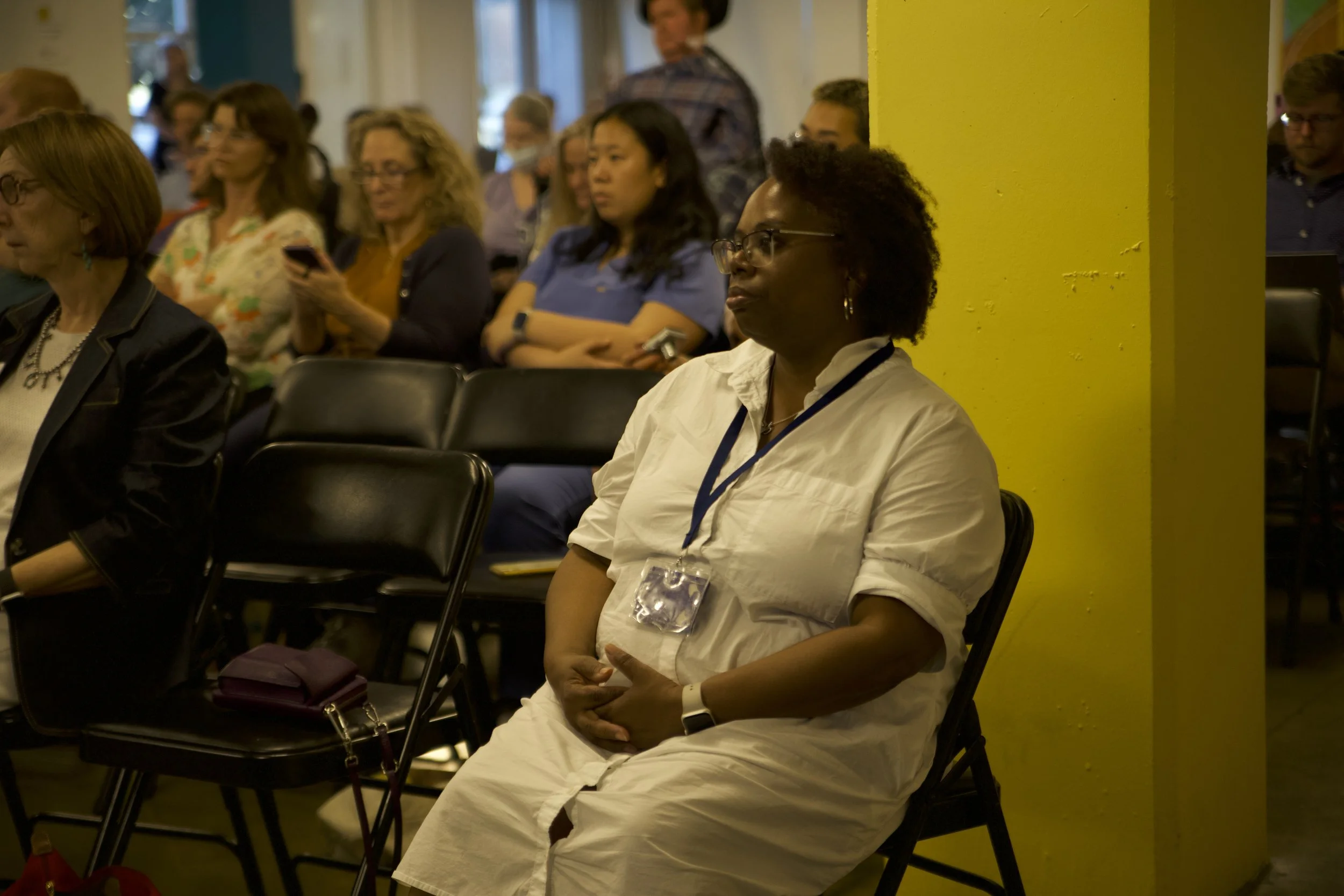City Council Candidates Gather For Disability Advocacy
From left to right, citywide Position 8 and 9 candidates Dionne Foster, Connor Nash, Council President Sara Nelson, Councilmember Alexis Mercedes Rinck, and Ray A. Rogers field questions on disability advocacy at El Centro de la Raza on July 14, 2025. (Photo: Mead Gill)
By Mead Gill
Nine Seattle city council candidates appeared at the Seattle City Council Candidate Forum on July 14 at El Centro de la Raza in Beacon Hill. Organized by the non-profit Washington Civil & Disability Advocate (WACDA), the public forum gave candidates the opportunity to share perspectives and policy on accessible housing, transportation, and Medicaid cuts affecting people with disabilities and their caregivers.
Hoping to represent District 2, Jamie Fackler, Jeanie Chunn, Adonis Ducksworth, and Eddie Lin made up the first panel. The second panel featured candidates for citywide positions, Ray A. Rogers and Councilmember Alexis Mercedes Rinck for Position 8, and Dionne Foster, Connor Nash, and Council President Sara Nelson for Position 9.
Moderator Barry Long, a wheelchair user due to a motorcycle accident 35 years ago, facilitated lightning rounds and short answer questions. “One thing about the disabled population is that we are the largest minority in the world,” he said. “We are also one that you can join on any random Tuesday. For me, it was a Sunday.”
Barry Long talks with community members after concluding the forum at El Centro de la Raza on July 14, 2025. (Photo: Finn Baker)
Reacting to Medicaid Cuts
Pamela Williams, the Mayor’s Council on African American Elders Chair and Regional Long-Term Care Ombudsman for King County, asked the candidates for proposed policy in response to the federal government’s Medicaid funding cuts earlier this month. She identified the cuts as detrimental to families’ ability to effectively support their elderly loved ones with disabilities.
Ducksworth connected the Medicaid cuts to systemic issues, calling for VOCAL funds to help compensate for human services and home repairs that the elderly and people with disabilities cannot perform themselves, often leading to forced relocation.
“Displacement is destabilization of the Black community,” he said, linking the issue to the lack of affordable housing that disproportionately affects people of color among the disability community.
Nelson called for the support of “our most vulnerable” and identified older Black people as approximately twice as likely to “suffer from disabilities” including dementia. Nash immediately responded, claiming there were actions the Council President could have already taken to combat the issue, one of many times throughout the forum he confronted Nelson directly.
Pamela Williams waits to ask candidates about recent federal Medicaid funding cuts at El Centro de la Raza on July 14, 2025. (Photo: Mead Gill)
Rinck, Chunn, Lin, and Fackler spoke on increasing taxes on large corporations as an effective strategy in disability advocacy in lue of federal funding cuts.
“These are not new challenges. These are systems that have been inadequate for a long time that are now being exacerbated by these devastating cuts,” Rinck said, highlighting her recent push for the Seattle Shield Initiative to use taxes on large corporations for the issues Williams described. She also called for a statewide payroll expense tax to be able to backfill for Medicaid cuts. “I may be a Seattle city official but I care about folks across the state.”
Chunn backed Rinck’s recent ballot measure that raises permissive revenue by changing the P&O tax on large corporations and allocating a portion of those funds to the special services Williams described. Lin agreed, saying “large corporations…won’t even notice” because they recently received one of the largest tax cuts in history, calling for increased grants for families to afford additional caregivers and make their homes more accessible.
“The social safety net is starting to unravel and the strings are being pulled,” Fackler said, supporting the pursuit of progressive revenue through capital gains tax in Seattle toward the issues Williams identified. “I feel strongly that those folks should pay their fair share of taxes.”
Conrad Reynoldson (right) asks candidates about accessible arts and culture with the help of his caregiver (left) at El Centro de la Raza on July 14, 2025. (Photo: Mead Gill)
Arts & Culture Accessibility
Vice President and Founder of WACDA Conrad Reynoldson asked the Position 8 and 9 candidates about their strategies in making the arts and cultural sectors more accessible—specifically if they would support a law requiring that venues no longer charge admission for caregivers. All five candidates said yes.
“That’s a new concept for me candidly, but I think it makes a world of sense,” Rinck said about the proposed law, a sentiment echoed by all District 8 and 9 candidates that generated a shared sense of enlightenment through the room.
Foster was upfront about her role in supporting Reynoldson’s proposed law. “I would be happy to work with you on legislation that is making sure that people aren’t essentially paying twice to go and experience an event,” she said.
Accessible Housing & Homelessness
According to WACDA’s fact sheet citing a 2020 King County Study, 41% of the chronically unhoused population in Seattle has a physical disability, compared to 17% of the nonchronically unhoused population. Furthermore, the city’s disability services are rarely accessible, leaving the most vulnerable populations without sufficient help. This makes affordable housing and homelessness major issues in context to people with disabilities.
When Position 8 and 9 candidates were asked by Long if they support Mayor Bruce Harrell’s use of encampment sweeps to address homelessness, Nelson and Rogers were indecisive while the rest said they did not agree.
When asked how they would ensure unhoused people wish disabilities receive accessibility services, Nash called for a variety of shelters including tiny home villages and single residency places while condemning Nelson’s support of encampment sweeps.
As a former homeless person, Rogers commended the services in place that provided for Seattle’s homeless population and pushed for the city to provide more incentives to housing developers to increase affordable housing.
Ducksworth wanted to use artificial intelligence to accelerate affordable housing permitting to help diversify housing options for people with disabilities and low-income, looking to the city’s Comprehensive Plan to make it happen.
Accessible Transportation
Kyle Matheson of People First of Washington and Self Advocates in Leadership (SAIL) asked the candidates how they will ensure a transportation system that works for people with disabilities.
For District 2, Fackler said that fixing unsafe light rail stations on Martin Luther King Jr. Way and Rainier Valley is a top priority for his campaign, calling for guards to increase safety for pedestrians and wheel chair users.
The only car-free council member, Rinck advocated for people with disabilities to have a seat at the table from the design process to implementation of the infrastructure and public transportation systems the city chooses to implement. She identified specific oversights like a design error in the G Line bus route that did not allow the right height to allow wheelchair access. “That is the design of service issue we need to address immediately…because It’s unconscionable,” she said.
Ducksworth, the Senior Transportation Policy and Operations Manager for the City of Seattle, took note of the $193 million budget in the city’s $1.5 billion transportation levy. While the current plan allows a minimum of 17% new sidewalks in District 2, he committed to increasing the minimum to 30%.
“Nothing About Us Without Us”
As the forum came to an end, Long addressed the candidates and their power to increase disability representation in decisions that directly affect the community.
“Don’t lose sight of the nothing about us without us,” Long said. “We are all in this as a community together.” He acknowledged that even though some of the candidates would not win, he requested that they all carry this with them.
For a full recording of the event, please use this link: https://www.youtube.com/watch?v=HuDXut3yxbU









